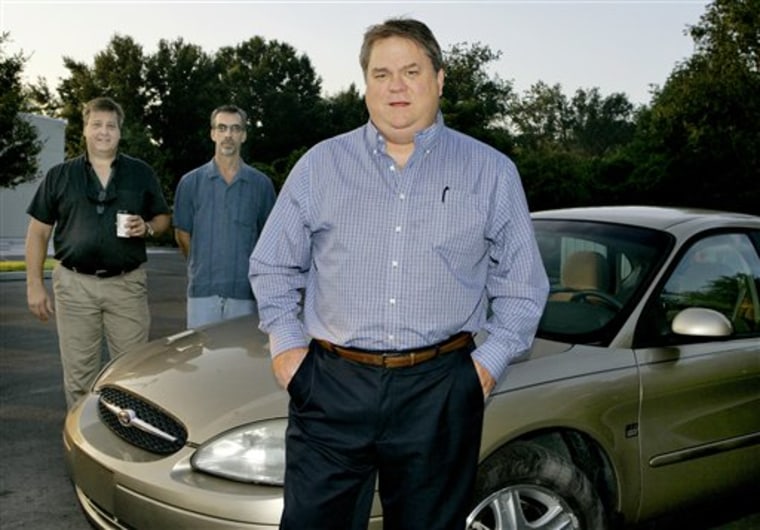Robert Gilliland didn't think much about carpooling until gas prices got out of control. Now, he's happy to trade his motoring freedom for $120 in weekly savings.
Gilliland found one rider through the classifieds Web site Craigslist and another using the carpool-matching service eRideShare.com. Thousands of commuters like him have turned to the Internet to arrange shared rides as average gas prices hover around $4 a gallon.
Each day, Gilliland picks up Brian McKenzie near his home in Lakeland, Fla., and Mike Rogers in Seffner on his way to work. He drops off McKenzie in Tampa and Rogers in Clearwater, where Gilliland works as a construction designer. He reverses that for the commute home.
The extra stops add up to an hour in round-trip commuting, meaning he could be spending three hours a day in his Ford Taurus, but the alternative is to shell out $150 a week out of his own pocket. With carpooling, his two passengers contribute $60 a piece; he pays only half of that to factor in wear and tear on his car.
"We've become friends," Gilliland said. "It's been a good experience for me socially as well as economically."
Gas prices have climbed even higher in the year-plus since Gilliland started carpooling. The number of daily visitors to eRideShare has jumped about threefold since February, when gas started to climb from the $3-a-gallon range. A rival site, Carpoolworld.com, had about 4,400 new U.S. registrations in both June and July, compared with some 800 in February.
Although some people turned to these sites long ago to help reduce pollution or take advantage of faster, high-occupancy vehicle lanes that require at least two occupants, the pocketbook has been the largest influencer of all.
"People are well aware of global warming, ... but it takes the price of gasoline to get them to take that step," said Steven Schoeffler, founder of eRideShare in Edwardsville, Ill. "It's something they wanted to do anyway but maybe needed a little extra impetus."
The various carpooling sites vary in how they connect commuters.
Craigslist offers straightforward classified listings, alongside the ads for new roommates and used furniture, for instance, while Zimride's Carpool works as a Facebook application, tapping the personal profiles users keep at the popular online hangout. Zimride also lets users rate others akin to eBay Inc.'s feedback system.
Even governments are jumping in. A program run by the Seattle-area King County Metro Transit has been online since 2001, while the Vermont Agency of Transportation wants to start automating by this fall a commuter-matching service it now runs manually by phone.
These services are generally free for drivers and passengers, who can work out whether they take turns driving or designate a single driver and chip in for fuel.
GoLoco, created by the co-founder of the Zipcar auto-sharing service, takes a 10 percent cut when participants use an optional online-payment service to avoid having to exchange cash in the car. Other sites make money on ads and commuter-related services, such as consulting.
Carpooling isn't for everyone, though.
Hoping to save about $30 a week, Michelle Sandoval has looked on Carpoolworld for rides near Los Angeles. But her hours in film production fluctuate so much that any arrangement would leave her "at the mercy of someone else's transportation schedule," she said.
Safety also has been a factor. Remember those warnings never to get into cars with strangers?
But those fears seem to have subsided with the higher gas prices.
"People have no choice at one point when the pocketbook is empty," said Isabelle Boulard, vice president for Datasphere Corp., the Jericho, N.Y., company behind CarpoolWorld. "They have to look for alternatives."
Operators of carpooling services say they know of no abductions or other criminal incidents resulting from their matches. They recommend that potential carpoolers speak on the phone first, or perhaps meet in person in a public setting.
It's like online dating, "but you don't have to be as picky" in choosing, said Brian Bass, creator of RideSearch.com.
And many matches wind up being people from the same company, school or community anyway. They may be co-workers on different floors, for instance, discovering their common commuting needs only through the Internet.
Mark Chase, transportation director for GoLoco, said the safety concerns haven't been as big a barrier as inertia. To help members vet potential matches, the site lets users create profiles stating their preferences for music and hobbies. But Chase said "people are kind of lazy about going beyond just posting a trip" request.
Yet those preferences may be crucial to a carpool's success. An NPR listener may shudder at the thought of spending a commute listening to Howard Stern or a fellow passenger yapping on a cell phone. A nonsmoker may want to avoid those who routinely light up.
Cathy Blumenthal, who coordinates King County's rideshare program, recommends that participants agree on rules ahead of time to reduce conflicts. Rules could cover the type of music, if any, and the time one waits for someone running late.
Perhaps the biggest concern of all is reliability. What happens when the driver you're relying on flakes out, or if you must stay at work late unexpectedly, forcing fellow commuters to leave you behind? Perhaps you have to leave early to take care of a sick child.
To address that, many government agencies have been providing registered carpoolers with guaranteed rides — a limited number of vouchers to pay for cabs home in emergencies.
Chase said carpooling can actually help ensure that people don't work too long.
"People who might be asked to stay late can just say, `I'm in a carpool and I have to leave at 5,'" Chase said. "That's a common excuse to get out of the office on time. That carries a decent amount of weight. I've been in several meetings where that has happened."
